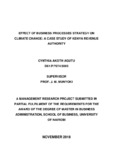| dc.description.abstract | While the need for costs savings remains the main reason for pursuing business processes that positively impact climate change, the ranking of other drivers has changed. Greenhouse gas reduction (climate change) has fallen from second to fourth place, government incentives have moved to the number two spot, enhancing brand image takes third place and energy security makes its first appearance in the list of top motivators. Thus, it is crucial to truly understand the problem we face with our choice of buildings and policies on business processes that touch on transportation and consumption. Kenya Revenue Authority like many other organizations is faced with the challenge of how to effectively actualize its strategic initiatives, in a manner that will not only lead to improved revenue collection but also that is sustainable and sensitive to environmental concerns, and within increasingly tight budgets. The aim of this study was to establish and examine linkages in the strategic, operations and sustainability process at Kenya Revenue Authority. The three variables were integrated into a viable framework that could be implemented to save the organization huge costs. To obtain the empirical research, a qualitative research method was adopted. Case study and interviews were used to collect data. Purposive sampling technique was used to identify participants. Content analysis was used to analyse the raw data. Validation and verification was achieved through work shop and focus group discussions. The key finding of this research was the development of a framework that comprises of strategies and practices which can be used to address operational issues and enhance an energy efficient work environment. Most participants were unanimous on the need for collective impact initiatives that entail a dedicated sustainability management team and a structured sustainability process that will lead to a common agenda, shared measurement, continuous communication and mutually reinforcing sustainability initiatives among all stakeholders. Although findings associated to energy efficiency have universal applicability, further research into alignment of strategic, operations and business management processes is strongly recommended, to validate the potential for utilizing the research findings to further develop frameworks for enhancing the six themes that were developed. | en_US |



